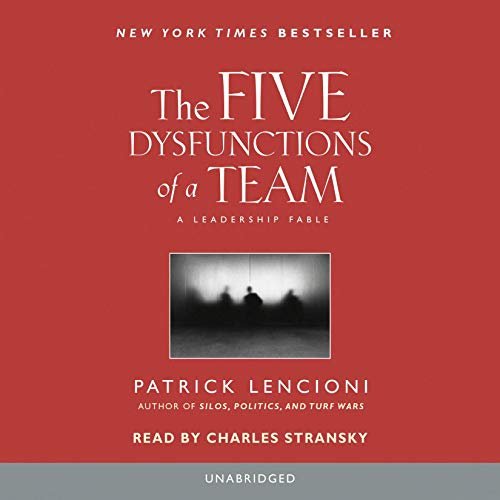The 5 Dysfunctions of a Team: A Leadership Fable

Physical Copy:
Audiobook:
By: Patrick Lencioni
Rating: A+
I am doing a deep dive into books about building a world-class team. In searching for the best books, this book popped up in top list after top list. The author illustrates the 5 dysfunctions of teams through a fable of a fictitious struggling Silicon Valley startup. I love authors that can teach through good storytelling. It is such a gift and welcome reprieve from the status quo in this genre.
The 5 Dysfunctions:
- Absence of trust
- Fear of conflict
- Lack of commitment
- Avoidance of accountability
- Inattention to results
Dysfunction 1: Absence of Trust
The author distinguishes between 2 types of trust: transactional and relational.
- Transactional trust: “I trust that you will do what you say.”
- Relational (vulnerability-based) trust: “I trust that I can share fear, failures, and doubt with you and not have it used against me. I trust that you are on my side.”
The dysfunction arises when the group is focused on the transactional component without building the relational component. In order to understand and navigate problems within a business, the team has to have enough trust to be radically candid.
The solution? Vulnerability. You have to be vulnerable about your own shortcomings and model that as a leader first.
Lesson 1: Being open about mistakes as a group will build trust.
When your people see that their leader and their peers have weaknesses and make mistakes, they will feel less hesitant to share their own flaws.
Dysfunction 2: Fear of Conflict
If teams do not have relational trust, there will be a fear of conflict, or, at least, it will be avoided.
Conflict is healthy. This isn’t referring to personal conflicts but rather constructive and ideological conflicts. A team needs to be able to have an intellectual debate around ideas, principles, approaches, and strategies. If a team is too afraid to be vulnerable, there will be “artificial harmony” and you may inadvertently run your ship across the rocks because people are too afraid to disagree to get to the best solution.
Lesson 2: Facilitate gathering honest feedback from the entire team.
You must model constructive, vulnerable, and honest debate around decisions within the business. Pull feedback out of your entire team.
Dysfunction 3: Lack of Commitment
If a team doesn’t engage in constructive and vulnerable debate, it will not gather commitment from each member.
“If people don’t weigh in, they won’t buy in.” - John Maxwell
We cannot assume that silence is agreement.
Lesson 3: Even if a few people disagree when making decisions, everyone needs to be committed to the final choice.
Every opinion needs to be heard. Most rational people will accept a decision, even if their opinion differs, as long as their feelings on the matter are listened to and addressed.
Dysfunction 4: Avoidance of Accountability
If you don’t have commitment and buy-in from your entire team, you won’t have agreement in the solution, and therefore, your team won’t hold each other accountable.
When you see missed deadlines or people not making a project a priority, your team is avoiding accountability.
Lesson 4: Hold your people accountable with measurable deliverables.
People need to know what success looks like in measurable terms. Give them clear success criteria and routinely hold them accountable to results.
Dysfunction 5: Inattention to Results
Without accountability, a team will lack the confidence that everyone will pull together to deliver the collective results.
When the individuals focus on their own performance and not the overall performance of the team, they miss deadlines, they don’t deliver to the customer, they don’t get the overall desired outcome. No matter how great the individual performance, the team doesn’t get results.
Value is measured by results. Results are how we solve problems for customers. Results are how businesses stay in business.
Lesson 5: Focus on collective results rather than individual goals.
Create specific and measurable goals for your teams. Communicate that clearly so that all are accountable.
If the group’s goal is clear and can be measured, members can’t only focus on their own goals because they will be accountable to accomplishing the team goal.
Conclusion
It is vital for successful and healthy teamwork to:
- Build trust by being vulnerable with your team. Show them your mistakes.
- Facilitate healthy conflict. Gather honest feedback from every team member.
- Commit fully to a project or decision as a team.
- Give everyone measurables and hold them individually accountable to the overall goal.
- Communicate clear and measurable goals for the project team. Prioritize the overall goal over individual performance.
